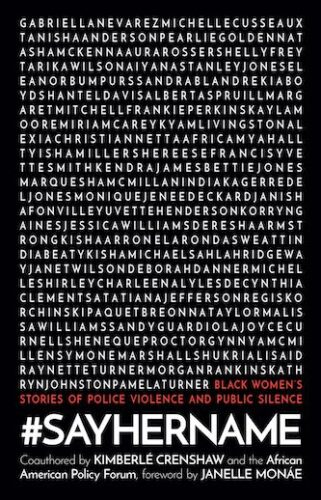Book Review: “#Say Her Name” — A Collection of Real Life Horror Stories
By Bill Littlefield
The brutal, sometimes sickening stories collected in #SayHerName are as much about the love, strength, and determination of the women who’ve lost female family members to police violence as they are about the circumstances of the victims themselves.
#SayHerName: Black Women’s Stories of Police Violence and Public Silence by Kimberlé Crenshaw and the African American Policy Forum. Haymarket Books, 305 pages.
 The stories in this collection are powerful and often discouraging. Multiple instances of police officers acting irrationally and with little or no regard for the lives of women who, in many cases, have broken no law…it makes for hard reading. Those telling the stories have lost female family members to those hyper-violent, often insanely hyperbolic police actions. Each narrative is followed by analysis that places the horrific event in the historic context of a nation that has sanctioned the devaluation and destruction of the lives of Black people in general and Black women in particular. The distinction Crenshaw, a professor at the UCLA School of Law and Columbia Law School, makes between the two horrors is that the stories of Black women killed by the police have not often inspired demonstrations or significant news coverage. They have not often been told. She is careful to avoid saying that Black men killed by police officers have received too much attention; she merely wants to remind us of the many Black women who’ve suffered the same fate.
The stories in this collection are powerful and often discouraging. Multiple instances of police officers acting irrationally and with little or no regard for the lives of women who, in many cases, have broken no law…it makes for hard reading. Those telling the stories have lost female family members to those hyper-violent, often insanely hyperbolic police actions. Each narrative is followed by analysis that places the horrific event in the historic context of a nation that has sanctioned the devaluation and destruction of the lives of Black people in general and Black women in particular. The distinction Crenshaw, a professor at the UCLA School of Law and Columbia Law School, makes between the two horrors is that the stories of Black women killed by the police have not often inspired demonstrations or significant news coverage. They have not often been told. She is careful to avoid saying that Black men killed by police officers have received too much attention; she merely wants to remind us of the many Black women who’ve suffered the same fate.
Crenshaw refers to what has happened to these women and their families as “the permanent double erasure of death and anonymity.” She has found, by surveying audiences, that while the names of George Floyd, Eric Garner, Tamir Rice, and other Black men killed by police officers are well known, the names of most of the Black women — Michelle Cusseaux, Shelly Frey, Miriam Carey, and 174 others since 1975 — who’ve died at the hands of police officers are not, though nobody can deny they’ve been victims in great numbers. Among the more stark statistics in Professor Crenshaw’s analysis: “Black women make up just over 10 percent of the female population in the U.S., yet they account for one fifth of all women killed by the police and almost one third of unarmed women killed by the police.”
Crenshaw attributes this circumstance to the historical suppression of Black women from this nation’s beginnings:
American history bears witness to a wide litany of abuses inflicted specifically on Black women: reproductive violence, sexual assault, economic exploitation, overpolicing and underprotection. These are all state-based methods of controlling, disciplining, and assaulting Black women.
Some readers may find shifting between the raw stories told by relatives of those killed by the police and the historical and sociological analysis of these circumstances challenging, but though her language is often academic, there is no mistaking Crenshaw’s passion for a more just, less deadly future for Black women. Her hope is that the African American Policy Forum and other organizations dedicated to bringing to the public the history and current fact of police violence against Black women will “challenge the reality” of the “marginality of Black women.” The brutal, sometimes sickening stories collected in #SayHerName are as much about the love, strength, and determination of the women who’ve lost female family members to police violence as they are about the circumstances of the victims themselves, and that should encourage readers, even as they are confronted with this collection of horror stories.
Bill Littlefield volunteers with the Emerson Prison Initiative. His most recent novel is Mercy (Black Rose Writing, 2022).
Tagged: #sayhername, African American Policy Forum, Black Women, Haymarket Books, Kimberlé Crenshaw
